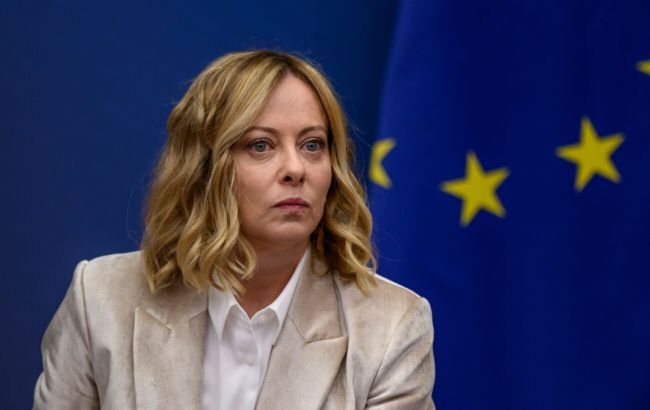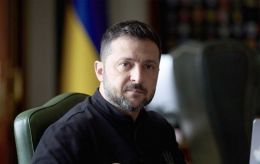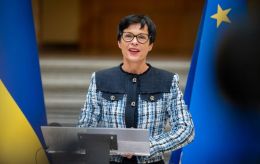Italian PM sidelined from EU leaders' Ukraine talks with Trump - FT
 Photo: Italian Prime Minister Giorgia Meloni (Getty Images)
Photo: Italian Prime Minister Giorgia Meloni (Getty Images)
French President Emmanuel Macron has accused Italian Prime Minister Giorgia Meloni of lying, making personal insults, and failing in diplomacy. German Chancellor Friedrich Merz is reportedly working to ease the tensions, according to the Financial Times.
German Chancellor Friedrich Merz attempted to ease tensions in the diplomatic row between Rome and Paris, sparked by the exclusion of Italian Prime Minister Giorgia Meloni from a group of European leaders coordinating with the White House on efforts to resolve the war in Ukraine.
The escalation occurred on Friday, May 16, after French President Emmanuel Macron accused Meloni of spreading "false information" about her absence from a meeting between a small group of European leaders and Ukrainian President Volodymyr Zelenskyy, as well as from a joint phone call with US President Donald Trump.
Meloni had traveled to Albania to attend the European Political Community summit, which gathered 40 European leaders, including Zelenskyy. However, she did not join a separate meeting between Merz, Macron, UK Prime Minister Keir Starmer, and Polish Prime Minister Donald Tusk. That meeting focused on the outcome of peace talks between Russia and Ukraine held earlier that day in Istanbul. Afterward, the leaders spoke with Trump and Zelenskyy and later released a statement calling Russia’s demands "unacceptable."
Meloni, who has consistently supported Ukraine and maintains close personal ties with Trump, told Italian reporters she was not included in the group due to her refusal to send troops to Ukraine as part of the proposed Coalition of the Willing to provide post-war security guarantees.
"Italy has long stated that it is not willing to send troops to Ukraine," she told reporters in Tirana. "It would not make sense for us to take part in formats that have goals in which we are not willing to participate."
In response, Macron stated that the deployment of military personnel was not discussed either in Tirana or during the recent weekend visit to Kyiv with Starmer, Merz, and Tusk.
"The discussion is about a ceasefire - let’s avoid spreading false information. There is already enough of that coming from Russia," the French president said.
Conflict dynamics and Merz as mediator
Chancellor Merz met with Meloni ahead of Sunday’s inaugural mass for Pope Leo XIV, trying to reduce tensions. He said both leaders agreed that Italy "must play a role" in all European peace initiatives regarding Ukraine.
"I will hold talks in the European Union in the coming days to include Italy in all our efforts to resolve this conflict," Merz said at a press conference in Rome. "We must not allow ourselves to be divided," he said, adding that there were no "first- or second-tier" EU members and that all countries were striving "to end this war as quickly as possible".
At the joint press event, Meloni called on leaders to "abandon egotism" and focus on "the unity of the West." She reiterated her support for a "just peace" that does not involve Ukraine’s surrender and called the Istanbul talks a "timid first step towards a peace process".
The FT noted that Meloni’s absence from the four-leader call with Trump, as well as Macron’s public criticism, caused a stir in Italy. Critics accused the prime minister of sidelining the country from key decision-making processes.
Meloni was also accused of lying about the real reasons behind her exclusion from the talks, with some allies claiming her animosity toward Macron influenced the outcome.
"Meloni is the custodian of the Italian national interest," Carlo Calenda, a centrist lawmaker, told a local television channel. "Not to go there out of personal antipathy towards one leader is something that you cannot accept."
The FT added that tensions between the French and Italian leaders have flared repeatedly since Meloni came to power in late 2022. Notably, Macron did not invite her to a private dinner with Zelenskyy in early 2023.
Beyond the long-running feud with Macron, Meloni also had strained relations with former German Chancellor Olaf Scholz. Alongside his Green coalition partners, Scholz had publicly criticized her migration policies.
Merz, whose Christian Democratic Union (CDU) has made a tougher migration policy a core platform, tried to show a warm rapport with Meloni. On Saturday evening, May 17, he addressed her by her first name, "Giorgia," and used the informal "du" in German.
"Together, we want a strong, secure, and competitive Europe," he said. "And I am therefore very grateful, Giorgia, that we were able to establish close contact with each other in the first few days."
Escalation of France–Italy dispute
In March, France hosted the Coalition of the Willing summit in Paris. At that meeting, President Macron proposed sending "deterrence forces" to Ukraine as part of security guarantees after the active phase of the war.
Meloni, however, was skeptical of the plan, warning that the Kremlin might see the deployment of "peacekeepers" as a provocation.
On May 10, Kyiv was visited by leaders from the Coalition of the Willing: Macron, German Chancellor Friedrich Merz, British Prime Minister Keir Starmer, and Polish Prime Minister Donald Tusk.
They discussed post-war peace conditions, including the potential deployment of European forces as peacekeepers. They also spoke with President Trump and agreed to give Russia a ceasefire deadline.
Meloni, however, did not join the trip to Kyiv, drawing criticism at home in Italy.

